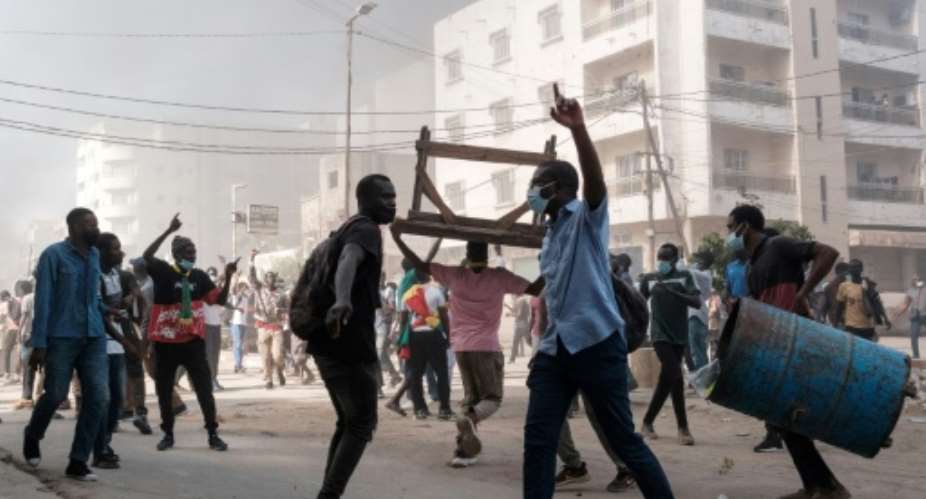Senegal's political crisis deepened as a second person died Saturday in increasingly violent protests against President Macky Sall's decision to postpone upcoming presidential elections.
A 23-year-old man died Saturday after being shot during clashes in the capital Dakar, two of his relatives told AFP, while a 22-year-old student died Friday in the northern town of Saint-Louis in still uncertain circumstances.
"The international and regional community must bear witness to the excesses of this dying regime," said presidential candidate Khalifa Sall (no relation).
Modou Gueye, a market vendor, took "a live round to the stomach" on Friday in the Colobane neighbourhood of the capital Dakar, said his brother Dame Gueye, 29, who was with him at the time.
His brother-in-law Mbagnick Ndiaye said he succumbed to his injuries Saturday morning.
Authorities have yet to confirm Gueye's death, but videos posted to social media suggest there were others injured as well.
In Saint-Louis, Alpha Yoro Tounkara died on the campus of Gaston Berger University where he was studying geography, and a hundred of his classmates held an all-night vigil for him.
The Interior Ministry issued a statement denying that security forces had operated within the university campus.
Reputation in question
 Gendarme drive their vehicle after clashes with protesters on the sidelines of a protest. By GUY PETERSON (AFP)
Gendarme drive their vehicle after clashes with protesters on the sidelines of a protest. By GUY PETERSON (AFP)
Anger has mounted since President Sall last week postponed until December a presidential election scheduled February 25. The postponement came hours before official campaigning was due to begin.
Protests were held across the country Friday and police made wide use of tear gas to keep crowds away from a main central square in Dakar, also closing main roads, rail lines and major markets.
Reporters Without Borders said at least five journalists were targeted by police in Dakar.
A new round of protests are planned for Tuesday.
Sall said he postponed the election because of a dispute between parliament and the Constitutional Council over potential candidates who were not allowed to stand, and has said he wants to begin a process of "appeasement and reconciliation."
The postponement has been criticised by the United States and European Union. Senegal's parliament backed the move after security forces stormed the chamber and removed some opposition deputies.
Parliament also voted to keep Sall in office until his successor takes office, which is unlikely to be before early 2025. His second term was due to end April 2.
The crisis has called into question the West African country's reputation for democratic stability in a region beset by military coups.





 Akufo-Addo’s recent attitude, utterances connote an arrogant nature, smack of an...
Akufo-Addo’s recent attitude, utterances connote an arrogant nature, smack of an...
 NDC calls for immediate termination of contracts between SML and GRA
NDC calls for immediate termination of contracts between SML and GRA
 NDC demands retrieval of monies paid to SML, calls for the prosecution of person...
NDC demands retrieval of monies paid to SML, calls for the prosecution of person...
 NDC accuses President Akufo-Addo of attempting to cover up corruption and crimin...
NDC accuses President Akufo-Addo of attempting to cover up corruption and crimin...
 Election 2024: ‘I don't want issues of independent candidature to plague NPP’ — ...
Election 2024: ‘I don't want issues of independent candidature to plague NPP’ — ...
 2024 elections: Bawumia avoiding economic discourse because he has failed — Kwak...
2024 elections: Bawumia avoiding economic discourse because he has failed — Kwak...
 Mustapha Ussif’s ‘Best African Sports Minister’ award signifies his exceptional ...
Mustapha Ussif’s ‘Best African Sports Minister’ award signifies his exceptional ...
 Anti-LGBQI+ Bill: High Court’s verdict was predetermined – Sam George
Anti-LGBQI+ Bill: High Court’s verdict was predetermined – Sam George
 Justification for continuation of SML-GRA contract ‘hogwash’ – Sammy Gyamfi
Justification for continuation of SML-GRA contract ‘hogwash’ – Sammy Gyamfi
 Bawumia is a liar, google it and see – Osofo Kyiri Abosom
Bawumia is a liar, google it and see – Osofo Kyiri Abosom
